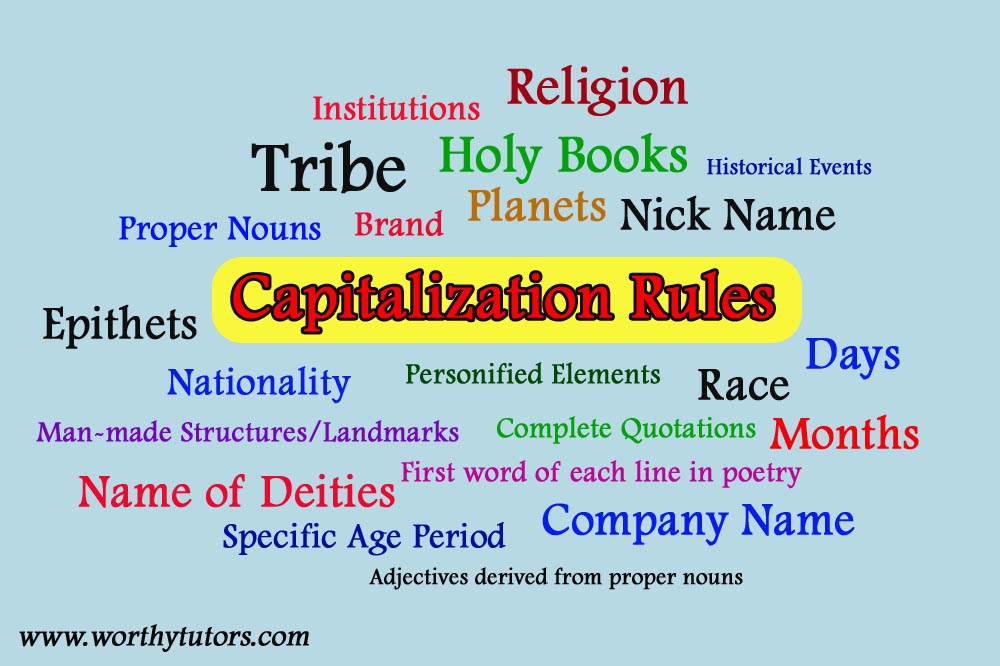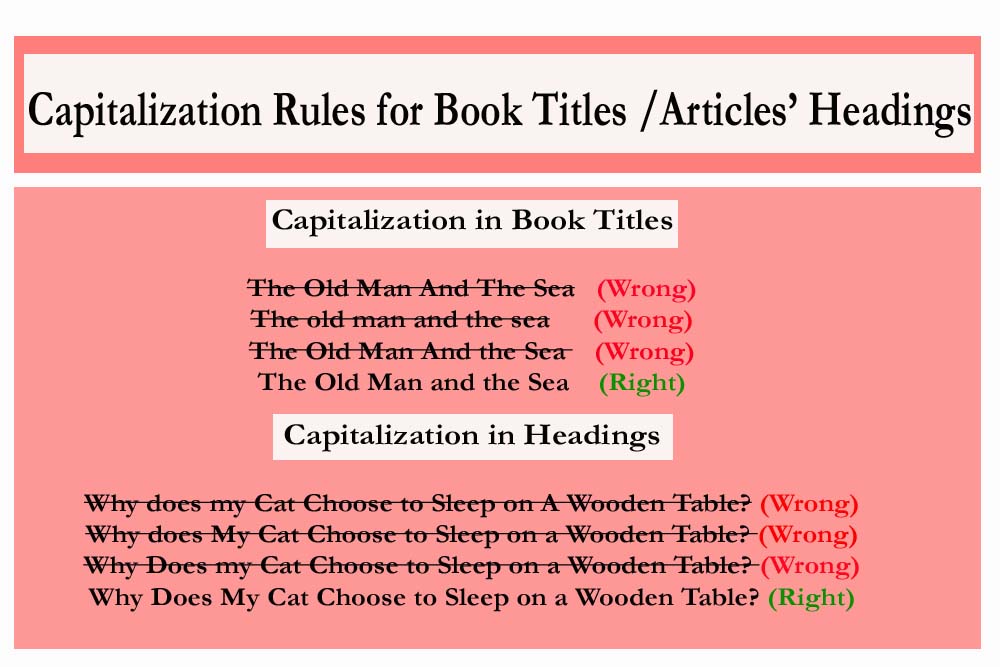
Capitalization Rules in English Grammar
Capitalization Rules in English grammar are very confusing for many writers. Even, regular writers become confuse that when they should capitalize a word in a sentence. It does not mean that the capitalization rules are very hard to remember. There are some simple rules that you should keep in your mind while writing in English language. We tried to cover almost all the capitalization rules in English writings. Hope you will enjoy this piece of writing.
What is Capitalization in English Grammar?
The word capitalization is taken from the word capital. In English language writing system, we have two types of letters: uppercase letters and lowercase letters. These are also known as capital letters and small letters respectively.
The written form of English language is comprised of combination of above two forms of alphabets. The major part of writing is comprised of lowercase letters but uppercase letter are also used in the writings. Uppercases letters are used occasionally and require lot of care.
In coming sections of this article, we will discuss all the capitalization rules in detail that one should know to write an errorless piece of writing.
Capitalize the first letter in all sentences
This is the basic capitalization rule of English. In English writings, first letter of first word of all sentences is capitalized. In a paragraph, all the sentences follow this rule. Either the first word is a proper noun or a common noun, you will start sentence with a capital letter. Look at below sentences.
- Joseph was playing hockey when you arrived.
- She is fifteen years old. Her name is Emma.
In above sentences, the initial letter of Joseph, she, and her is capitalized because the sentence are starting from these words.
Capitalize all proper nouns
All proper nouns in English language start with capital letter. Either a proper noun is at start of the sentence or in the center of the sentence, we always capitalize it. Look at below examples.
- Rashid is very intelligent boy in his class.
- Rashid and Sophia are neighbors and best friends.
In above sentences, the first sentence is starting with a name of a person that is a proper noun and we capitalize initial letter of all words so we capitalized it. In second sentence, the name Sophia is capitalized and it is not the starting word. We capitalized Sophia because it is a proper noun.
As mentioned above, we capitalize all proper nouns. Moreover, we capitalize all the adjectives that are derived from proper nouns. Look at the below example.
- Joshi loves Turkish sweets.
In above sentence, the word Turkish is an adjective that is derived from proper noun Turkey.
The names of cities, countries, states, nationalities, and languages are proper nouns, so always keep in your mind to capitalize them.
Note: Do not capitalize word ‘the’ before proper nouns.
Company name or brand name (trade mark)
Capitalize the initial word of name of companies. If the name of company is on multiple words, each word will start with capital letter.
- Rocky was hired for a job as a marketing officer in Sky International Marketing Agency. (company)
- I love Endure shoes because of their durability and affordable price. (brand)
In above sentences, Sky International marketing Agency and Endure are capitalized. Because first one is a name of company and second is a band.
Days and month, specific period and historical events
Remember to capitalize the initial word of days of the week and months of the year in English writings. Moreover, Specific period and historical events are also capitalized. You should also capitalize the initial word of special occasions. The name of holidays are also proper nouns and they are capitalized too. Look at the below examples.
- I will fly to Dubai in June. (Month)
- I love Sunday because on Sunday I play cricket whole the day. (Day)
- During Medieval Age, Chaucer and his successors produced most of the English literature. (specific period)
- In World War II, whole world suffered huge loss of human lives. (Historical event)
- Jolly gave him a rose on Valentine Day. (Holiday)
- All Olympic Games were postponed due to corona virus disease. (special occasion)
Note: Do not capitalize the names of seasons because they are not proper nouns.
- I love summer because I enjoy swimming.
Institutions and manmade structures
Capitalize the initial word of institutions, man-made structures and man-made landmarks. See the below examples.
- The syllabus of Cambridge School System is very comprehensible for the students.
- I offered last prayer in Faisal Mosque. (man-made structures)
- Joshi was first female who climbed Mount Everest this year. (landmarks)
In above sentences, Cambridge School System is an institution and all the institutions are capitalized in the same way. Faisal Mosque (located in capital of Pakistan) is a manmade structure and Mount Everest is a landmark so that is why they are in upper cases.
Capitalize the initial letter of planets.
Al the planets of galaxy are written like proper nouns: Mercury, Venus, Mars, Jupiter, Saturn, Uranus, Neptune, and Earth.
- We know that Mercury is the closest planet that revolves around the sun.
Note: Earth is capitalized only when it is discussed as a planet.
Races, nationalities, tribes
Capitalize the initial letter of races, nationalities, and tribes because these are proper nouns.
- The “Haitian” or “Negro” races or generally known as “Black or African American.” (race)
- German people are tall than Japanese people. (nationality)
- I love African culture especially of Yoruba tribe. (tribe)
Nicknames ad kinship names
Nicknames are also capitalized like the names of the people. If the name of a girl is Jasmine and family members call her Jasi because of love. So all the times the nickname Jasi will be capitalized.
- Meet my younger sister, Jasi. She is very attractive and cunning.
Remember to capitalize the kinship names when they are used in place of a personal name.
- I am glad to know that Mom is also coming with us.
However, these kinship names are not capitalized when used in possessive case, or followed by person’s name, or when they do not refer to a specific person.
- We enjoyed the journey in company of your mom. Jade’s grandpa were also with us during the whole journey.
When to capitalize a title
This is very tricky to remember that when to capitalize a title. Remember that capitalize all the titles whenever used directly before a name.
- Chairman of the Board Henry Joseph will be chairperson at the meeting.
Do not capitalize the titles whenever followed by the names by a comma. Moreover, do not capitalize the title if it is used instead of a name in a sentence.
- The chairman of the board, Henry Joseph, will preside the meeting of water conservancy.
- The president will address meeting next Sunday..
There is difference between titles and occupations. Do not capitalize occupations before full names or followed by names.
- The accountant Henry Joseph was present in the meeting.
- The doctor, Merry Lucas, was attendant of the patient.
You can capitalize a title/occupation that replaces someone’s first name in a sentence.
- Welcome! Here comes Doctor Lucas.
Moreover, a title is also capitalized when it is used as a direct address. Because when a word id used instead a name of a person during direct address, it becomes a proper noun like a name of a person.
- Will you teach me, Professor?
Capitalize the pronoun ‘I’
Usually pronouns are not capitalized but pronoun I is always capitalized.
- When I came home, all flowers were fading.
Capitalization in quotations
Never forget to capitalize the first word in a complete quotation (even it is in mid of the sentence).
- Rocky replied, “The race was not easy with old car, but we won by two seconds”.
In some cases, do not capitalize quoted phrase when it continues a sentence.
- Rocky assured us that the matter was “far from over” and that “we will win.”
Capitalization after colon
Always capitalize first word after colon if colon is followed by a complete sentences. See the blow example.
- Jose gave me beautiful advice on my birthday card: Always speak truth and be kind to everyone.
Keep one thing in your mind that never capitalize initial letter of word in a list that follows a colon. Look at the example blow.
- I want to buy stationary items: pens, rubber, paper, and colors.
Religions, holly books, and names of deities
Capitalize the initial letter of all religions, holly books, and names of deities in all formats writings. Do not capitalize the word ‘god’ if its use is non-specific.
- There is no god, but Allah.
- There is place for terrorism in Islam.
- Quran, Torah, Zabur, and Injil are holy books.
- In Greek mythology, Zeus is the god of the sky.
Note: Do not capitalize words like heaven, hell, satanic etc.
- Let her go to the hell.
Capitalization of directions and regions
Do not capitalize directions (north, south, east, west) and derivative words (southern region) when they refer to a direction or general area.
- Jockey lives in the west of city.
- The southern region of the country was affected by torrential rain last night.
However, you should capitalize all directions when become part of a proper name or refer to a specific region.
- Heavy rain in Midwestern states broke all the previous records.
- Chile is the closest country to the South Pole.
- The Indian people love Western culture.
Moreover, remember to capitalize well-known region names: East Coast, Southern California, West Coast etc.
- The West Coast of USA is also known as the Pacific Coast.
Capitalize salutations
Always capitalize first word of a salutation, as well as the first word of a closing. See below examples;
- Dear Billy
- Regards
Rules of capitalization in poetry
In poetry, the capitalization rules are bit changed. In poetry, first word in each line of stanza is capitalized. Moreover, in poetry personified elements are also capitalized. Personified elements are those elements that are inanimate objects and poet attributes them with a trait of living being. (See more about personification).
- The angry Sun showering heat on the shore
In above line, poet personified the sun because sun cannot be angry like living beings but the context of poet is that the sun is too much hot.
The capitalization rules for book titles, movies, and headings in paper
In book titles, all nouns, all pronouns, all verbs, all adjectives, and long prepositions (four or more than four letters) are capitalized. On the other hand, all articles, all conjunctions, and short prepositions are not capitalized. First word is always capitalized as usual either a preposition or an article.
- A Tale of Two Cities
- For Who the Bell Tolls


